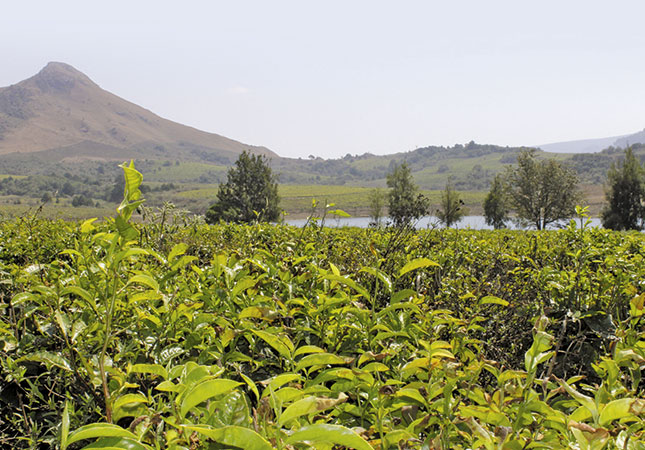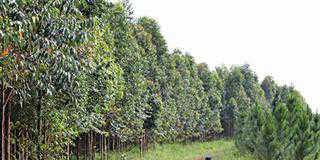
Photo: Lindi van Rooyen
The South African tea industry came to an abrupt halt when subsidies were abolished in the 90s. Farms were abandoned and eventually bought by government, which has been struggling to make them viable ever since. The Seenteko Tea Estate, among timber plantations between Nelspruit and Barberton in Mpumalanga, may be the exception to the rule. The farm was bought by government in 2007 and transferred to the Shamile community as part of its land claim settlement.
READ:Challenges of banana farming in South Africa
It lay unused until 2011 when Roger Duffield, CEO of Plandaí Biotechnology, saw an opportunity to revive the tea plantation by producing superior green tea extract. Dunn Roman Holdings, a subsidiary of Plandaí (Gaelic for plant, pronounced ‘plancha’) leases the land from the Shamile community on a 49–year contract. The farming operation is run by Breakwood Trading and extraction is handled by Green Gold Biotechnologies.
The project has been financed through a loan of R100 million from the Land Bank, as well as capital from private investors who have financed research and the development of intellectual property.

Taking a chance
Leon Doyer, CEO of Dunn Roman, admits that the venture carries risk as the land is leased from a large community. He is adamant, however, that farming can take place without a title deed, and there needs to be a mindshift in agriculture to appreciate this. “We’ve put everything in place from a legal point of view, but there are no guarantees,” says Doyer. He is quick to point out, though, that the Shamile community are a pleasure to work with.
“To prevent any tension, we keep the community informed of our progress. A community representative attends all our meetings and there’s community board representation in the subsidiary companies. In addition, the beneficiaries have open access to the farm.” Doyer is aware of government’s interest in the farm.
“This could be a good example of how to make land reform projects work, as very few are successful commercial enterprises. Thousands of hectares are transferred to beneficiaries and then nothing happens,” he says. The government, Doyer adds, wants a solution to all the dormant tea farms. “But to take the tea from harvest to the supermarket is too expensive, so it would be making a loss. Green tea extract is a more profitable way of farming tea in South Africa.”
The community is benefiting from the lease agreement. As part of the contract, it enjoys preferential employment opportunities with training provided. It also receives dividends, rental income from the land and its asset is being restored.
Doyer says that when the project began, the land was in poor condition. “We had to start from scratch: 150km of roads had to be repaired, 39 bridges rebuilt and 250 labourers’ homes fixed.”
The estate currently has 575ha of Camellia Sinensis tea, but a veld fire destroyed much of this in 2007. These bushes are currently being re-established. By January, Plandaí is hoping to harvest tea from 300ha. In the preceding months, labour training and fine- tuning of the production process will take place.
During the next eight years, the plantations will be expanded to 1 000ha to bring the farm into full production. At that stage, the farm will employ up to 1 000 labourers. Doyer says the plan will depend on how big the market turns out to be. An on-farm nursery – established in December last year – provides new plants for the estate. It currently has one million plants to revitalise areas that were destroyed by the fire or have died out. These cuttings remain in the nursery for five months and are then planted. It takes four years before a harvest can be taken off these bushes.
James Goosen, tea production manager, is aiming to have five million plants in the nursery in order to keep up with the expansion plans of the farm. “We’ll also be experimenting with other tea clones from next year to improve the quality,” he says.

The tea picking season runs from September to April, after which the bushes become dormant. Every 30 days, a new harvest can be taken off the top of the bush. The bushes yield 10t/ ha during the eight months in season and there are about 9 000 plants/ha.
Crop protection
Because the estate has been mostly disease-free, excessive crop protection has not been necessary. “We have a few aphids but that doesn’t justify insecticide. We also produce all our own plant material from cuttings, so we don’t need to bring in any,” says Goosen. Overgrown bushes are cut back and the cuttings left on the ground to form mulch. Granule fertiliser is added after the bushes have been table-topped in August before the harvest season starts. Foliar fertiliser is sprayed three times a year, according to leaf analysis.
Gert Kemp, tea production manager, explains that for now, chemical weed control is used on the farm because the plantations have been neglected for a while. “But eventually the cut-offs left on the ground will suppress weed growth and anything that comes through will be trampled on by the workers moving between the rows.”
The farm is dryland cultivated and receives an average annual rainfall of 1 200mm. Once the buds have been picked, they are placed in an enclosed, vacuum-lined trailer that keeps leaves at the same temperature as when they were picked.
They are then delivered to the on-site factory, where the fresh leaves are processed, making use of the proprietary extraction system currently being installed. The 300ha that will be harvested from January to April next year is expected to produce roughly 80t of extract for the season.
Marketing
The extract will be marketed by Plandaí and sold mainly in Europe and the USA, where it will be used in various forms, from sports and nutrition drinks to beauty products. Currently, green tea products are not as effective as they could be because the health compounds are mostly broken down by the body and not absorbed.
“Pheroid technology will revolutionise the market because of the increase in bioavailability to the person consuming the extract,” Doyer explains. The world Pheroid licence has been granted to Plandaí by North-West University for PhytofareTM PheroidTM formulations. This greatly improves the absorption of the green tea extracts by the body and will put Plandaí ahead of its competitors. According to him, the price range will be broad and dependent on quality. Producers can expect anything between R300/ kg and R3 000/kg.
Job creation
One reason for the failure of the SA tea industry is the high labour intensity and consequently high labour costs. But Doyer says that due to the higher price that tea extract fetches compared with leaves, the labour is more affordable. For the first harvest in January, the farm will employ 350 people, including 40 workers at the extraction factory. About 20 of the workers will be from the local community.
“The extreme labour intensity of tea farming is a huge concern,” says Doyer. “We had already applied for the loan from the Land Bank and worked out the budget when the minimum wage was increased in March. We had to apply for exemption and explained to the workers that if the venture was to make it, the wages could not be increased to the new minimum. They accepted it because they realised that it was either that or nothing.” The farm can currently house 250 workers, including managers. The company is hoping to accommodate all workers on the farm in season. “The farm used to accommodate 1 000 people but the houses have gone to ruins. We’re busy fixing them up.”
Confidence
The risks involved in the project have not deterred the venture’s backers from making big investments. Doyer says while they are fully aware of what could go wrong, they have a great deal of faith in the project. “We’ve already come very far against great odds,” he says. Kemp adds that the team involved is also positive and anxious for results. “This venture will be a success; there’s no argument about it. The structures are in place and there are professional people with a lot of experience on board.”
Phone Dunn Roman Holdings on 013 750 3002.
Twitter: @lindi83
This article was originally published in the 18 October 2013 issue of Farmer’s Weekly.













